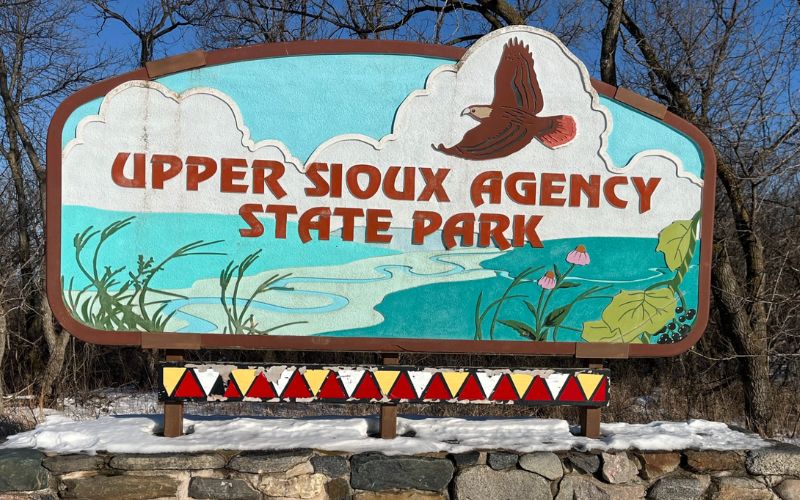
- Details
- By Kaili Berg
The park will be closed to the public beginning February 16, as it prepares to transfer the land back to the Upper Sioux Community.
The Upper Sioux Community has had a longstanding request for the State of Minnesota to return the land that holds secret burial sites of Dakota people who died during the U.S.-Dakota War of 1862 when the U.S. government failed to fulfill treaty promises
The 1,3000-acre park of rolling hills, bent oak trees, and wild prairie flowers includes the remains of a government-run campus of employee housing, warehouses, and a manual labor school that was destroyed in the war.
Chief Walking Iron Mazomani, leader of the Wahpetonwan (Dwellers in the Leaves) Dakota Tribes, was also buried on a ridge at the state park after being killed during the Dakota War’s Battle of Wood Lake.
After the U.S. won the war, numerous Dakota people were taken into custody by the U.S. military, according to the Minnesota Historical Society. Over the course of three weeks, the military commission tried 392 Dakota men for their participation in the war and sentenced 303 of them to death. The defendants were not allowed legal representation and some trials lasted less than five minutes.
On December 26, 1862, 38 Dakota men were hung in Mankato, an event that remains the largest single execution in American history. A memorial honors the Dakota men killed, located 110 miles from the park.
Kevin Jensfold, Chairman of the Upper Sioux Community, had asked lawmakers and the U.S Department of Interior for 18 years to close the park, arguing that it was unjust that Dakota people needed to pay a state fee to visit the graves of their ancestors, according to MPRnews.
Lawmakers made the decision to return the land during last year’s legislative session. The transfer is folded into several large bills covering variouus issues. The bills allocate more than $6 million to facilitate the transfer by 2033.
The Upper Sioux Agency State Park is one of the less visited state parks, getting about 35,000 visitors a year. The park has also faced challenges in the past, needing costly repairs caused by main roads and access points being washed out from flooding of the Yellow Medicine River.
Ideas suggested from public input on new recreational opportunities include hiking, camping, biking, horseback riding, and whitewater kayaking.
This is the first time Minnesota has transferred a state park to a Native American community. In recent years, some tribes in the U.S., Canada, and Australia have gotten their rights to ancestral lands restored through the Land Back movement, according to MPRnews.
Once the park is closed the DNR will remove park infrastructure prior to the land transfer set to take place in March.
More Stories Like This
Gwich'in Tribal Governments Submit Comments Challenging Fish and Wildlife Service's Inadequate Environmental Review of Arctic Refuge Snow RoadRappahannock Tribe Challenges 9M-Gallon Water Plan
Feds release draft long-term plans for Colorado River management
Apache Leader Walks 60 Miles to Court Hearing That Will Decide Fate of Sacred Oak Flat
Rappahannock Tribe Raises Sovereignty and Environmental Concerns Over Caroline County Water Permit
Help us defend tribal sovereignty.
At Native News Online, our mission is rooted in telling the stories that strengthen sovereignty and uplift Indigenous voices — not just at year’s end, but every single day.
Because of your generosity last year, we were able to keep our reporters on the ground in tribal communities, at national gatherings and in the halls of Congress — covering the issues that matter most to Indian Country: sovereignty, culture, education, health and economic opportunity.
That support sustained us through a tough year in 2025. Now, as we look to the year ahead, we need your help right now to ensure warrior journalism remains strong — reporting that defends tribal sovereignty, amplifies Native truth, and holds power accountable.
 The stakes couldn't be higher. Your support keeps Native voices heard, Native stories told and Native sovereignty defended.
The stakes couldn't be higher. Your support keeps Native voices heard, Native stories told and Native sovereignty defended.
Stand with Warrior Journalism today.
Levi Rickert (Potawatomi), Editor & Publisher


